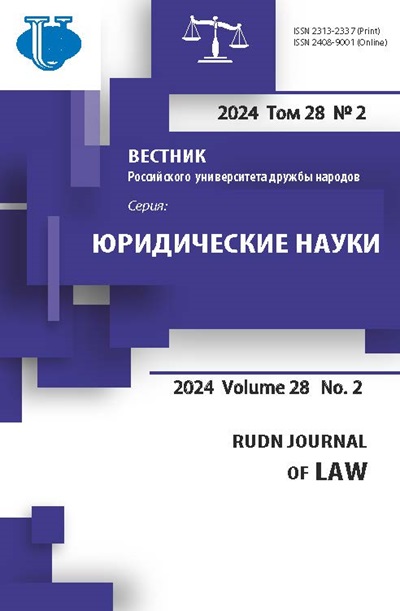Proof and proving: legislative technique of criminal procedure laws of the Republic of Moldova and the Russian Federation
- Authors: Vereshchagina A.V.1
-
Affiliations:
- Vladivostok State University
- Issue: Vol 28, No 2 (2024)
- Pages: 436-453
- Section: PROCEDURAL LAW
- URL: https://journals.rudn.ru/law/article/view/39500
- DOI: https://doi.org/10.22363/2313-2337-2024-28-2-436-453
- EDN: https://elibrary.ru/JIAJLY
- ID: 39500
Cite item
Full Text
Abstract
Proof and proving lies at the heart of criminal procedure regulation, significantly impacting the quality of law enforcement. In the post-Soviet states that once shared a unified legal system during the USSR dissolution, original criminal procedural laws emerged, exhibiting intriguting examples of evidence and proof rules’ layout. The purpose of the study is to discern the distinct design characteristics of evidence and prove institutions in the criminal procedure laws of the Republic of Moldova and the Russian Federation. The study’s methodological framework rests upon the general scientific principles of cognition such as objectivity, comprehensiveness, pluralism, and historicism. It employs historical, formal-logical and comparative methods, as well as document analysis. By comparing the normative models of evidence and proof institutions in Moldovan and Russian criminal procedure laws, a shared approach to the concept of evidence as a fusion of form and content becomes apparent. Distinct features of the Moldovan criminal procedure law include the systemic and structured arrangement of evidence rules, the formal adoption of the concept of a means of proof, and precise use of terminology. Conversely, the Russian criminal procedure law disperses evidence rules actoss general and specialized sections, leading to regulatory duplications and terminologicals inaccuracies. The historical roots of the evidence and proof institution layout trace back to November 20, 1864, Charter of Criminal Procedure. The Charter’s systematization of norms reflected the nuances of the pre-revolutionary Russian process. Despite the subsequent stage structuring evolution during the Soviet era and procedural form differentiation, the Soviet legislator retained the pre-revolutionary rules’ systematization on evidence. Presently, the current criminal procedure law maintains much of the previous regulatory content, highlighting essential areas for enhancement in evidence and proof institution design to allign more closely with the process’ stage structure and procedural form differentiation, thus mitigating potential abuse of rights. Addressing these design shortcomings is crucial. Rectifing Russian legistation following the comparative study allows drawing insights from Moldova’s legislative experience.
About the authors
Alla V. Vereshchagina
Vladivostok State University
Author for correspondence.
Email: vereschagina_alla@mail.ru
ORCID iD: 0000-0002-2243-0007
SPIN-code: 3889-3723
Candidate of Legal Sciences, Associate Professor of the Department of Criminal Law Disciplines
Russian Federation, 690014, Vladivostok, Gogol str., 41References
- Baranov, V.M. (2017) Essays on the technique of lawmaking. Selected works: monograph. Moscow, Justice Publ. (in Russian).
- Isaenko, V. (2013) On phonoscope forensic examination samples. Criminal law. (6), 114-119. (in Russian).
- Ivanchin, A.V. (2014) Internal and external legislative technique in the structure of criminal lawmaking: monograph. Ryazan, Kontseptsiya Publ. (in Russian).
- Kalyuzhny, A.N. & Vlasov, V.V. (2013) The study of objects and documents in the law of modern Russia: aspects of the production and recording. Bulletin of Vladimir Law Institute. 1(26), 91-93. (in Russian).
- Kibak, I.A. (2013) Legislative technics in Legislative activity. Bulletin of the Moscow University of the Ministry of Internal Affairs of Russia. (1), 214-222. (in Russian).
- Kornev, A.S., Kuznetsov, V.A., Novikov, A.V. & Kostarev, D.F. (2022) The results of operational-search activities as evidence in the investigation and consideration of criminal cases (empirical analysis). Matters of Russian and International Law. 12(4А), 306-316. https://doi.org/10.34670/AR.2022.13.58.027 (in Russian).
- Negru, B. & Cojocar, V. (1997) Legislative Technique: Lecture Notes. Part 1. Chisinau. (in Romanian).
- Negru B., Cojocar V. Tehnologia legislativă: note de curs. Partea 1. Chișinău, 1997. 110 p.
- Polenina, S.V. (2011) Legal technique as a social phenomenon in the conditions of modernization. State and law. (9), 5-14. (in Russian).
- Schmidt, A.A. (2019) Structural analysis of the operational-search activity “inquiry”. Actual problems of combating crimes and other offenses. (19-1), 24-25. (in Russian).
- Shafer, S.A. (2015) Investigative action - the legitimacy of new interpretation? Lex Russica. 107(10), 115-127. https://doi.org/10.17803/1729-5920.2015.107.10.115-127 (in Russian).
- Skurko, E.V. (2022) The language of law. Moskow, Yurlitinform Publ. (in Russian).
- Smochina, A. & Smochina, C. (2023) National legal doctrine: history and contemporaneity. Legal studies and research. Part 1. (5), 13-29. (in Romanian).
- Smochină A., Smochină C. Doctrina juridică națională: istorie și contemporaneitate // Studii şi cercetări juridice. Partea. Nr. 5. 2023. Pp. 13-29.
- Soloviev, O.G. (2015) The place and significance of университета legislative techniques in the process of constructing the norms of criminal legislation). LegaL Science. (3), 65-68. (in Russian).
- Timoshenko, A.A. (2007) Legal and technical problems of improving criminal procedural legislation. Legal technology. (1), 80-88. (in Russian).
- Vereshchagina, A.V. (2010) The project of reform of the preliminary investigation, prepared by commission of N.V. Muravyova. The Territory of New Opportunities. The Herald of Vladivostok State University of Economics and Service. 2(6), 52-62. (in Russian).
- Vereshchagina, A.V. (2021) On the issue of abuse of law in Russian criminal proceedings. The Territory of New Opportunities. The Herald of Vladivostok State University of Economics and Service. Vol. 13, № 4, 156-166. https://doi.org/10.24866/VVSU/2073-3984/2021-4/156-166 (in Russian).
- Vlasenko, N.A. (1995) Fundamentals of legislative technique. Irkutsk, East Siberian Book Publishing House. (in Russian).
- Yakovets, E.N. (2023) Law enforcement intelligence “survey”: Modern understanding. Ius publicum et privatum: online scientific and practical journal of private and public law. 1(21), 212 - 218. https://doi.org/10.46741/27132811.2023.21.1.023 (in Russian).
- Yakusheva, T.V. & Nikulin, N.V. (2018) Investigation Activity as a Constitutional Guarantee of Obtaining Evidence at Preliminary Investigation. Izvestiya of Altai State University. Legal Sciences. 6(104), 148-151. https://doi.org/10.14258/izvasu(2018)6-27 (in Russian).
Supplementary files















